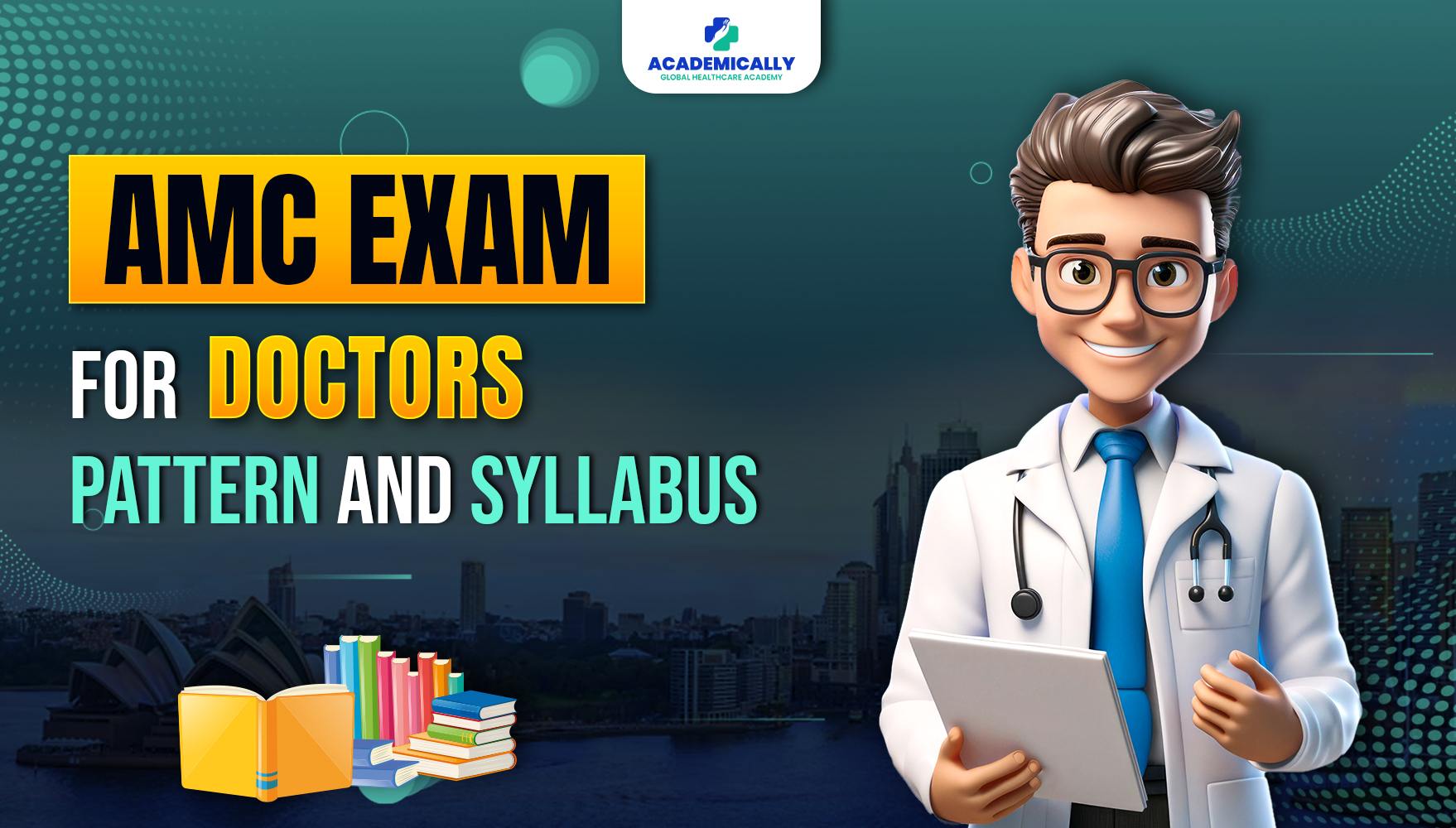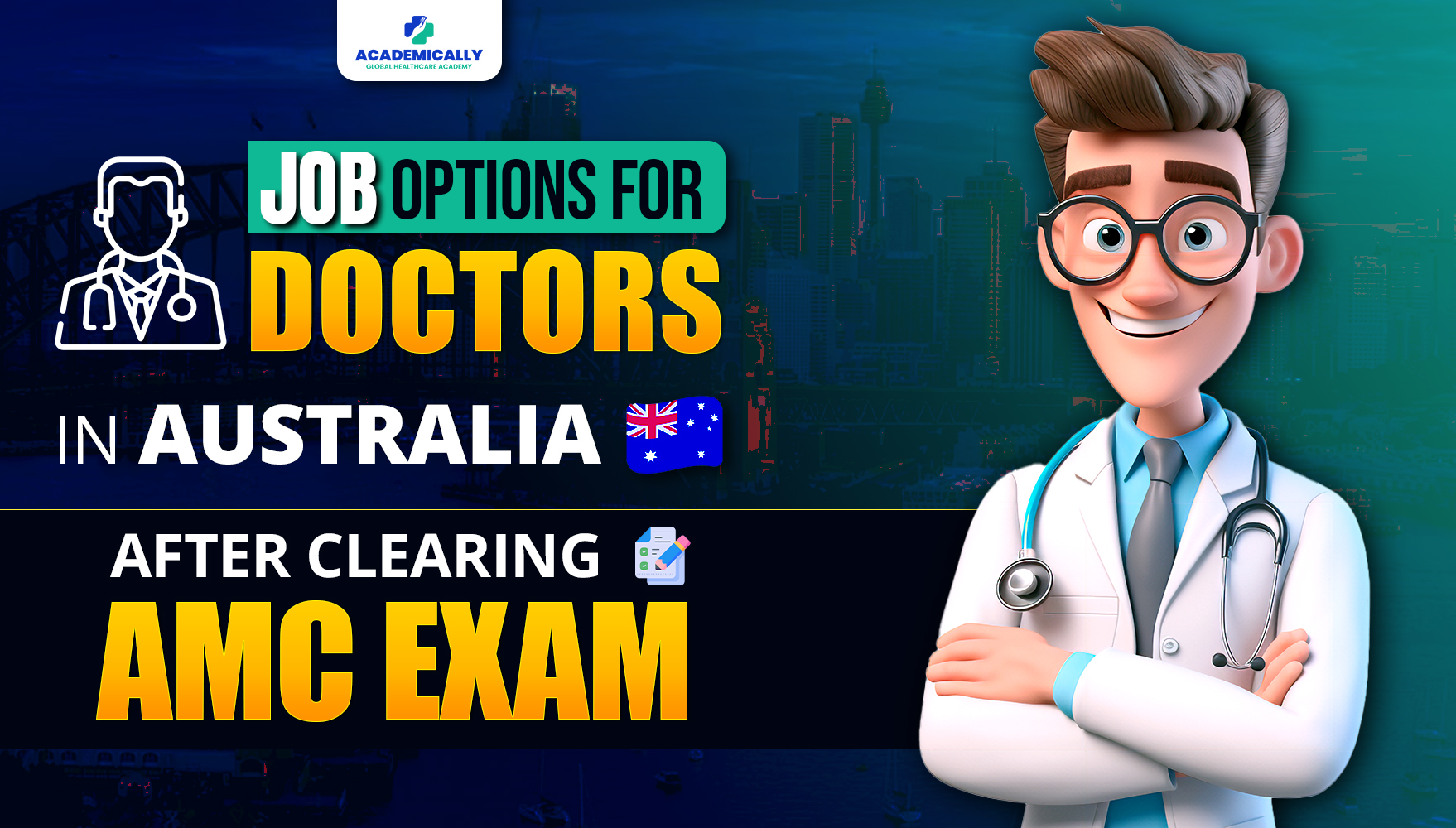KNOW THE AMC EXAM PATTERN
When it comes to the pattern of the AMC exam, there are two parts. The first part is known as the AMC MCQ and the second part is the clinical examination or workplace-based assessment.
AMC MCQ EXAMINATION
The AMC MCQ examination is conducted as a Computer Adaptive Test (CAT) and consists of 150 multiple-choice questions that are administered over 3.5 hours. At least 50% of the questions will be obtained from a pool of previously calibrated questions. The remaining questions will be fresh ones that have not appeared in the previous AMC MCQ examinations.
There will be five choices with one correct answer. The questions revolve around essential medical knowledge, including areas like the disease process, clinical examination and diagnosis, investigation, therapy, and management. The candidates are supposed to answer all 150 questions.
With the CAT format of MCQ, each candidate will deliver a unique examination that is customised according to the previously recorded responses by them.
In this method of examination, the first question is randomly chosen from the existing item pool. Based on whether the answer of the candidate is correct or incorrect, the following questions will be difficult or easy, difficult or easy, respectively. This process will go on until 150 questions are completed.
The ability estimate of the candidate will be calculated by the computer after each response. The ability estimate becomes clearer and more precise with each recorded answer and will be evaluated as the latest ability estimate of the candidate.
Also Read: AMC Exam Eligibility Criteria
AMC MCQ SCORE
A cut-off is defined for the entire examination, and the candidate will be measured against this point regardless of the questions with which they were administered or the group of candidates with whom the candidate was examined.
When it comes to computing the passing score of the candidate, The AMC Exam score is a representation of the candidate's ability level, measured on a scale of 0 to 500 for convenience. A passing score is set at 250 on this scale. It is important to complete all 150 items in the AMC CAT MCQ examination to ensure sufficient information for a reliable and accurate assessment of the candidate's ability.
Failure to complete all items may result in an incomplete determination of the candidate's ability and, consequently, an indeterminate result on the AMC adaptive scale. The examination result may be recorded as Fail insufficient data to obtain a result. Each candidate receives a computer-generated transcript of their results and feedback on their performance in the MCQ examination.
Must Read:
WHAT DOES THE AMC EXAM SYLLABUS INCLUDE?
The MCQ examination is a comprehensive examination of applied medical knowledge and practice. The syllabus for this examination includes adult health (medicine and surgery), women's health, child health, mental health, and population health.
The 150 MCQs selected for this examination are weighed in the following manner.
| AMC CAT MCQ BLUEPRINT | ITEM TOTALS |
| Adult health (medicine) | 30% |
| Adult health (surgery) | 20% |
| Women's health (Obs, Gyn) | 12.50% |
| Child health | 12.50% |
| Mental health | 12.50% |
| Population health | 12.50% |
| Item Total | 100% |
Adult Health Medicine and Adult Health Surgery
A large portion of adult health and aged care consists of these patient groups. This section involves sufficient knowledge of medical sciences related to physiology, biochemistry, anatomy, and pharmacology and an extensive understanding of pathobiology and pathophysiology.
Developing and practising clinical skills like communication, history taking, physical examination, and counselling, along with an appropriate understanding of principles of treatment and familiarity with current management strategies, are also essential.
Women's Health
When it comes to women's healthcare, gynaecology covers a broad spectrum. Gynaecology and obstetrics involve all the above-mentioned principles of adult health, accompanied by an understanding of the basic sciences as they apply to reproduction and the effects of pathobiology and pathophysiology on the reproductive process.
Child Health
Child health comprises developmental dimensions of children's health from foetal development and transition to extrauterine life to the end of adolescence, including growth, physical development, puberty and intellectual development in normal and abnormal situations.
The syllabus encompasses a comprehensive range of core clinical skills and the management of common and significant conditions in various healthcare settings, including emergency, ambulatory, inpatient, and convalescent settings. This includes medical, surgical, and psychosocial interventions aimed at addressing these conditions effectively.
Mental health
The evaluation, diagnosis, and treatment of physiological, behavioural, and mental illnesses, disorders, and addictions dealt with by all age groups are covered. The assessment process includes history, mental state features, investigations, and comorbidities, with the management approach including the use of psychological/behavioural, physical, pharmacological and psychotherapeutic interventions, with their risks and benefits.
Population Health and Ethics
Population health strategies for improved health of the targeted population include screening activities, surveillance, vaccination programs, population-level education, epidemiology and legislation or disease management measures.
Population health concepts are relevant and applicable in various healthcare settings and for all patient groups. These concepts encompass strategies for health promotion and disease prevention. Ethical considerations address professional conduct, including matters related to boundaries, patient confidentiality, informed consent, and the identification of impaired doctors.
Legal issues encompass the regulations governing the Australian healthcare system and the provision of optimal medical care.
Also Read: AMC Exam Books
Conclusion
Doctors aspiring to migrate to Australia can take the AMC examination. With the right guidance and preparation methods, clearing this step will not be as complicated as you think. Clearing the AMC and migrating to Australia to set up a top-notch healthcare career will be huge milestones. If you are confused about where to start or have questions in mind, reach out to us, and we will gladly assist you.
Fill up this form for a free one on one counselling session.




